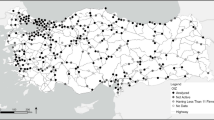Abstract
Purpose The purpose of the article is to identify the strategic parameters of industrial clustering in regions and to evaluate such parameters in terms of the region’s economic and social development. Design/Methodology/Approach Industrial clustering in regions meets various problems, the identification, and elimination of which should become the basis of cluster policy at both the regional and the national levels. At the same time, the strategic aspects of industrial clustering in regions have not been sufficiently explored. The authors’ study has found that various views and approaches to effective industrial clustering in regions need to be carefully examined and systematized. Findings In the article, it has been shown that the strategic parameters of industrial clustering in regions include the following: the region enterprises investment attractiveness level, the level of the region enterprises innovative activity, the total R&D investments in the region, the level of support for entrepreneurship in the region, the region industrial population size and the level of clusters support. The methodology assessing the strategic parameters of industrial clustering is proposed, using which makes it possible to rank regions in terms of cluster support and to emphasize the relationship of industrial clustering and economic and social situation in regions. Originality/Value The use of the proposed methodology assessing the strategic parameters of industrial clustering in regions could allow public authorities to evaluate the quality of regional management and to improve the tools of cluster support in regions. The assessing results can be used to identify the problems of industrial clustering in regions and to carry out targeted activities to cluster support and development.
Access this chapter
Tax calculation will be finalised at checkout
Purchases are for personal use only
Similar content being viewed by others
References
Babkin, A., & Novikov, A. (2016). Cluster as an economic entity: Essence, current state, development. Scientific and Technical Statements of St. Petersburg Politechnological University, 1(235), 9–29.
Bulyarskii, S., & Sinitsin, A. (2014). Conditions for regional industrial clusters formation. Regionology, 3(88), 102–112.
Enright, M. (1996). Regional clusters and economic development: A research agenda. In U. Staber (Ed.), Business networks: Prospects for regional development (pp. 190–213). Walter de Gruyter.
Industrial Park. (2020). Technoparks. In Clusters: Geographic information system (GISIP). Retrieved 10.05.2020, from https://www.gisip.ru/#!ru/region/81/
Korchagina, I. (2017). Formation and functioning of clusters of small enterprises in the region: Assessment methodology and trends. Regional Problems of Economic Transformation, 3(77), 53–59.
Krugman, P. (1991). Geography and trade. MIT Press.
Malmberg, A., & Maskell, P. (2002). The elusive concept of localization economies: Towards a knowledge-based theory of spatial clustering. In AAG Annual Conference 2000 Proceedings of the International Conference, New York, USA, February 27–March 3, 2000. Environment and Planning A, 34, 429–449.
Marshall, A. (1920). Principles of economics. Retrieved 11.05.2020, from https://www.econlib.org/library/Marshall/marP.html
Morosini, P. (2004). Industrial clusters, knowledge integration, and performance. World Development, 32(2), 305–326.
Porter, M. (2000). Location, competition, and economic development: Local clusters in a global economy. Economic Development Quarterly, 14(1), 15–34.
Rating of Economic and Social Status of Regions. (2019). Retrieved 11.05.2020, from https://riarating.ru/infografika/20190604/630126280.html
Report Cluster Programmes in Europe and Beyond. (2019). Directorate-general for research and innovation. European Commission. Retrieved 10.05.2020, from https://www.clustercollaboration.eu/sites/default/files/news_attachment/cluster_programmes_in_europe_and_beyond_0.pdf
Smart Guide to Cluster Policy. (2016). The European cluster collaboration platform. Retrieved 11.05.2020, from https://www.clustercollaboration.eu/cluster-definitions
Smorodinskaya, N., & Кatukov, D. (2019). When and why do regional clusters become the basic link of the modern economy. Baltic Region, 11(3), 61–91.
Sölvel, Ö. (2008). Clusters. Balancing evolutionary and constructive forces. Ivory Tower.
The Role of Clusters in Smart Specialisation Strategy. (2013). Directorate-general for research and innovation. European Commission. Retrieved 10.05.2020, from https://ec.europa.eu/research/evaluations/pdf/archive/other_reports_studies_and_documents/clusters_smart_spec2013.pdf
Vardapetyan, V. (2009). Conditions for cluster development and formation. Creative Economy, 8(32), 85–91.
Veselovskii, M. (2017). Innovative territorial clusters formation of as a basis for improving the efficiency of regional economies. Regional Economic Issues, 3(32), 26–38.
Author information
Authors and Affiliations
Corresponding author
Editor information
Editors and Affiliations
Rights and permissions
Copyright information
© 2022 The Author(s), under exclusive license to Springer Nature Switzerland AG
About this chapter
Cite this chapter
Patrusheva, E.G., Raikhlina, A.V., Tumanov, D.V., Karasev, A.P. (2022). The Problems of Industrial Clustering in Region Strategy Development. In: Popkova, E.G. (eds) Business 4.0 as a Subject of the Digital Economy. Advances in Science, Technology & Innovation. Springer, Cham. https://doi.org/10.1007/978-3-030-90324-4_63
Download citation
DOI: https://doi.org/10.1007/978-3-030-90324-4_63
Published:
Publisher Name: Springer, Cham
Print ISBN: 978-3-030-90323-7
Online ISBN: 978-3-030-90324-4
eBook Packages: Earth and Environmental ScienceEarth and Environmental Science (R0)




